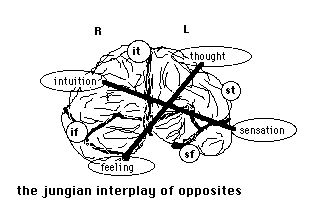
balance
All things carry yin and hold to yang;
their blended influence brings harmony.
Lao-Tse
It has become common knowledge that the left and right hemisphere of the brain dominantly deal with different intellectual functions. The left brain primarily handles: logic, language, numbers, sequence, analysis, chronology, and so on, while the right brain deals with rhythm, colour, imagination, intuition, feeling, day dreaming, spatial relationships, and so on. Both sides need to be used in conjunction for creative success. The Right brain controls the left side and the Left brain controls the right side. The one cannot very well control both sides: there has to be balance even physically, hence either side must be controlled. This is called cooperative opposition. Jung calls this 'balancing the opposites'. Many people think that you only have to 'tell' a person that he 'ought' to do something in order to put him in the right track. But whether he can do or will do it is quite another matter. Little or nothing is achieved by telling, persuading, admonishing good advice. Creativity is linking one's own energy to the latent opportunities in the world around us. The individual is the controlling force that links, the 'vessel' in which outside and inside come together.
'In between' us (ego) and external reality is the filter of our emotions. Jung used the term "shadow" to refer to unrecognized or unwanted drives and desires that are denied. To create this balance we have to know our own particularities, the manner in which we 'meet the outside'. Jung distinguished two ways of perceiving reality (or processing data): namely through sensation and intuition (the irrational functions),

and two ways of judging reality: thinking and feeling (the rational functions). These two dimensions are often combined to identify different personality types. According to which functions are dominant (or which are in the shadow), we can identify four ways of dealing with the world and of shaping one's reality: ST individuals tend to be empiricists who sense and think their way through life, making judgements and interpretations on the basis of "hard facts" and logical analysis.SF individuals also tend to pay a great deal of attention to data derived from the senses, but arrive at judgements in terms of "what feels right" rather than in terms of analysis. IT individuals tend to work their way through life by thinking about the possibilities inherent in a situation. Their actions tend to be shaped by ideas and insight rather than facts. IF individuals tend to be guided by a combination of insight and feeling which pays much more attention to values than to facts.
When one style of action is dominant, then the other styles occupy background roles. Clearly since each style presents an alternative way of understanding the same situation, opportunities may be lost in this imbalance. Working in teams may benefit if the difference in approach is used. For an individual to attain this balance is no easy matter. He must get acquainted with the details and have knowledge of his psychic inventory. The full balance means feeling his way into all the nooks and crannies of his mind. This can never be done for us. It is the personal quest for the sense of her/his life. To be or not to be. [Go to Lilliput start] Go to Brobdingnag start page] [Go to Laputa start] [Go to Houyhhnhm start] [Go to Creative Self start]
An interesting example is Leonardi da Vinci, the all-round renaissance man. He painted, sculptured, designed fortresses, was an architect, knew more about aeronautics than anybody else, was the strongest man of Florence, etc. etc. Da Vinci was an extremely poised person, both physically and psychically.
His hobby was ambidexterity (two-sidedness) and he could write and work both left and right-handed, as well as in mirror script; he was both in body and mind perfectly balanced.
Da Vinci gave the following advice:
1 study the science of art
2 study the art of science
3 develop your senses (i.e. we look without seeing, hear without hearing etc.)
and added as a final statement:
4 everything connects to everything else
The implications of his final statement are that if you are interested in one thing you are interested in everything, hence it is a certain attitude (seems very taoistic). The opposite of the "I don't care attitude", which creates a black (w)hole, where you disconnect yourself and will finally shut off the brain. The uncreative person tends to experience life as mildly depressive - except for the holidays.
Creativity >> making your life an exhilerating experience
[back to English Index] [Back to start page] [Back to first entry of this site]